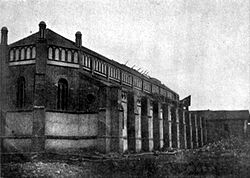Mpala
| Mpala | |
|---|---|

Bishop’s Palace, Mission of Our Lady of M'Pala
|
|
| Coordinates: 6°44′47″S 29°31′54″E / 6.746314°S 29.531679°ECoordinates: 6°44′47″S 29°31′54″E / 6.746314°S 29.531679°E | |
| Country | Democratic Republic of the Congo |
| Province | Katanga Province |
| District | Tanganyika |
| Founded by | Captain Émile Storms (Association Internationale Africaine) |
Mpala is the location of an early Catholic mission in the Belgian Congo. A military station was established at Mpala on the shores of Lake Tanganyika in May 1883. It was transferred to the White Fathers missionaries in 1885. At one time it was hoped that it would form the nucleus of a Christian kingdom in the heart of Africa. However, after a military expedition had to be sent to protect the mission from destruction by local warlords in 1892, civil control returned to the Belgian colonial authorities. The first seminary in the Congo was established at Mpala, and later the mission played an important role in providing practical education to the people of the region.
Mpala lies on the west shore of Lake Tanganyika in the Tanganyika District of Katanga Province, to the north of Moba and south of Kalemie. The station was established at the mouth of the Lufuku River. The lake is about 400 miles (640 km) long and 45 miles (72 km) across. An 1898 book described it as an inland sea, navigated by a regular flotilla. At that time Albertville (now Kalemie), Mpala and Baudouinville (now Kirungu) were the main stations on the west shore of the lake. Captain Storms, who founded Mpala, said the climate was healthy. According to an 1886 in the Dublin Review,
... the fertility of the ground is such as to yield two crops of wheat or three of rice in a single year. Palm oil and india-rubber are to be had in abundance, the ivory furnished is said to be of the best quality, and the forests contain inexhaustible supplies of valuable timber. The stations were not only able to subsist on their own resources, but also to supply the wants of passing caravans...
In 1882 the International African Association had a military post at Karema on the east shore of Lake Tanganyika. Captain Émile Storms took command of this post, then founded Mpala on the west shore of the lake, opposite Karema on the east shore, laying the foundations on 4 May 1883. He was assisted by the German explorer Paul Reichard. He named the station after the friendly local chief Mpala, who on his deathbed told his people to obey the Europeans. Storms gained authority during the two and a half years he spent at Mpala. The local chiefs came to rely on him for a monthly salary and for protection.
...
Wikipedia

